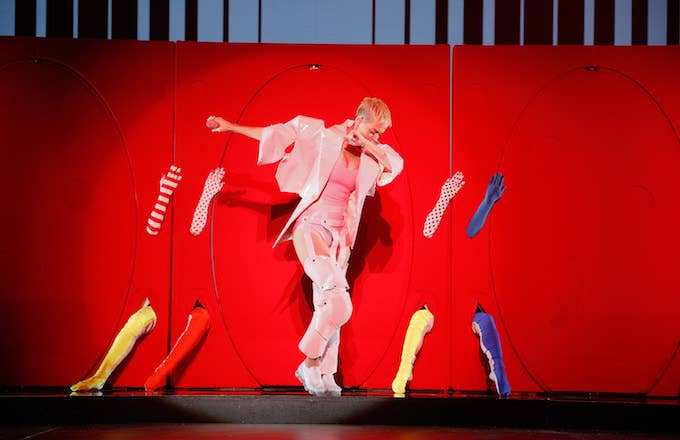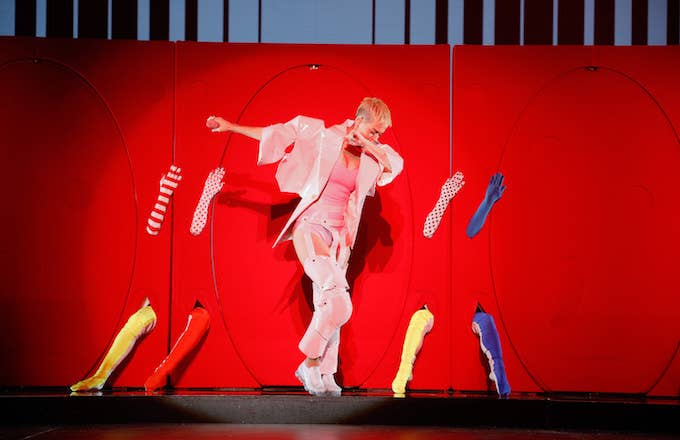
Pop music, like every other section of American life, experiences the growing pains brought on by social progress. Artists often recognize the importance of drawing attention to injustice, using their platforms as political vehicles—but more often than not find mixed results putting that into practice. In the pop arena, taking a stand is always subject to the rule of capitalism (think Taylor Swift telling folks to vote but not publicly supporting...anyone) and ideologies often run the risk of tokenization. But music fans aren’t stupid, and when something is powerful and genuinely pushes forward the fight for progress (Beyonce’s Lemonade, for instance), they recognize it. Most recently, Katy Perry has become a target for criticism—largely because she’s spent the last few months rebranding herself as an activist (it says so right in her Twitter bio).
The pop powerhouse who first made noise by kissing a girl and liking it—in a way that could have been inclusive but ultimately fetishized lesbian relationships and gendered casual hookups—has had some major hiccups in her journey to wokeness. When Perry first entered the music industry, she was Katheryn Elizabeth Hudson, maker of gospel music in line with her conservative Christian upbringing. After that trajectory proved unsuccessful, she pursued secular music, moved to L.A., started working with pop producers and eventually found a home in the pop-punk/Warped Tour scene—which, when placed next to a conservative Christian upbringing, reads radical and open to some, a hotbed for rock music-shaped misogyny for the rest of us.
Soon Katy Perry’s success eclipsed the Warped world and she spent her days recording massive pop hits—thanking god it’s Friday and celebrating California gurls—making the world feel good even in times where it might’ve been easier to do the opposite. She made forays into social justice by working with certain pioneering charities—speaking openly about LGBTQ rights (even accepting the National Equality Award in March at the Human Rights Campaign gala) and blasting Proposition 8. Then, in 2014, she put her clout behind Hillary Clinton, when she offered to write a theme song for Clinton’s campaign.
Clinton earned her then-most famous supporter, and Perry began cultivating a new identity—or, perhaps, she was just making something visible that we hadn’t been privy to before. (It’s worth noting that Perry did support Obama’s run for re-election, but backing Clinton over Bernie or another Democratic candidate speaks to Perry’s leanings.) When many quote-unquote “woke” artists were cheerleading Bernie Sanders, Perry was Team Clinton. Whatever her motives, it signified Perry’s inching towards some explicitly liberal perspective.
At the beginning of this year, in the wake of Clinton’s defeat, Perry released the Skip Marley collabo “Chained to the Rhythm,” her first single since 2016’s “Rise,” following 2013’s Prism. Her first attempt at making what she calls “purposeful” music, the reggae-tinged track not so-subtly attacks Trump’s America. She sings, “It is my desire to break down the walls/Inspire” in the chorus, and repeats, “Think we’re free, free/We’re chained to the rhythm.”
To create purposeful music, you need to state a purpose.
She told theInternational Business Times, “This was after the election and I was kind of depressed and, you know, I definitely didn't want to write a club banger. It was a nice exercise of writing a song that at first listen is a really fun song, but I guess the more you dive into it, it has a different subtext."
For an initial try at politically minded music, it misses the mark. At no point does she direct her frustrations anywhere specifically—there’s nothing concrete in the language. To create purposeful music, you need to state a purpose. “Chained to the Rhythm” offers conversation about Perry-the-person instead of Perry-the-artist-activist. In its vagueness, it’s easier to speculate about her motives, since there isn’t any real content to interrogate.
Since the song’s release, Perry has opted for an androgynous look, wearing her hair short, cropped, blonde, perhaps strictly as an aesthetic flirtation with the idea of androgyny. It could stand for a certain gender fluidity, or, at the very least, can signify some subversion of socialized gender norms. Could be that it’s just a haircut. I normally avoid describing a woman’s appearance but this calls for an exception, as it seems to relate to this new chapter in her career.
More recently, Perry came under fire again when she made a joke comparing her famous black locks to Barack Obama: “Someone said they miss your old black hair,” the singer said on Instagram, “Really? Do you miss Barack Obama as well? Times change. Bye!” In the same week, she rolled up to the famous Met Gala wearing a dress by designer John Galliano, who in 2011 was given a suspended fine of 6,000 euro for screaming racist and anti-Semitic rants at people in a bar in Paris. A few days after that, a 2013 tweet from rapper Mano resurfaced, describing in detail the time Perry referred to him as the N-word. He retold the story in greater detail, making Perry look gross, tone-deaf, and privileged.
While it is admirable that Perry is making some moves towards some advancement (there’s got to be some genuine curiosity in the advancement of human kindness here, even if it is completely tone deaf), it’s clear that there’s so, so, so much work to be done. Awareness doesn’t arrive by simply performing it. It begins by doing your research before making things, by staying quiet when it’s someone else’s time to speak, to do purposeful things—which doesn’t require you to make purposeful pop, necessarily. Perry’s place in the resistance should be what she has always done—make us feel good, even when things are not good. Unless, of course, she’s actually ready to take action. In which case, we will be watching.

